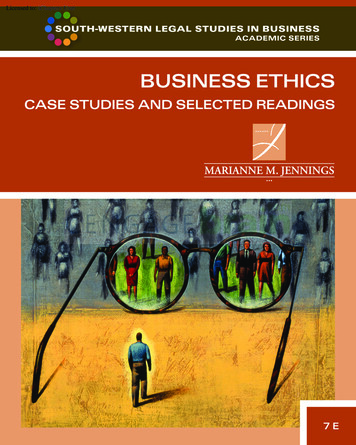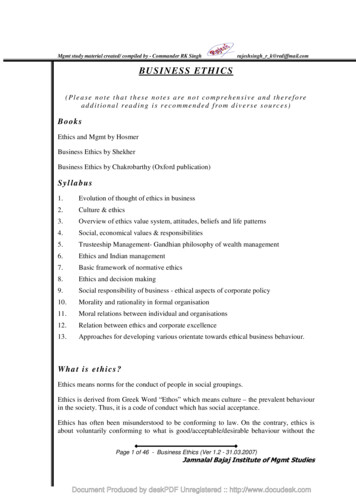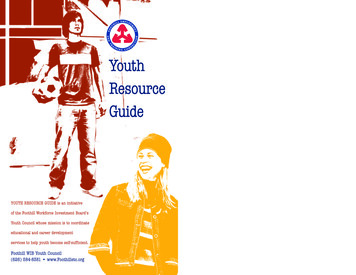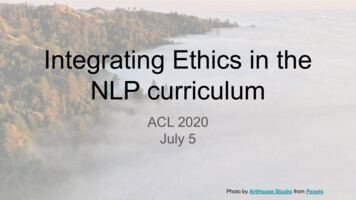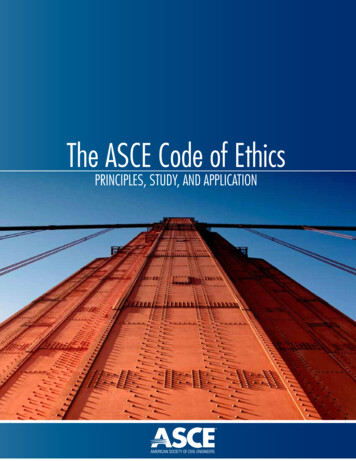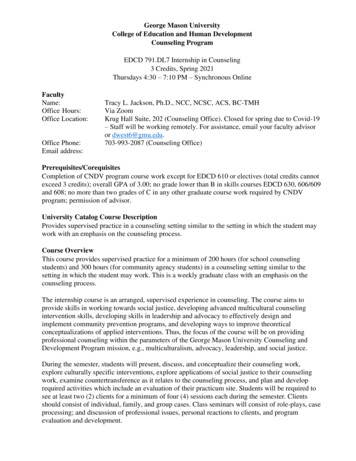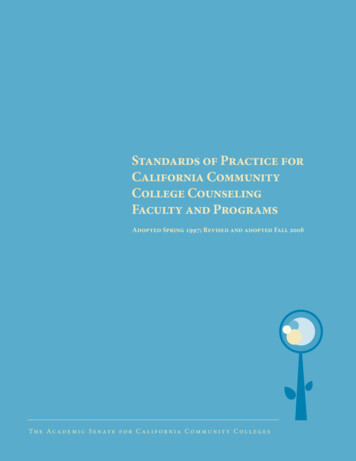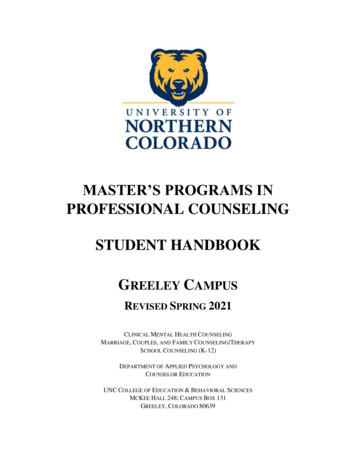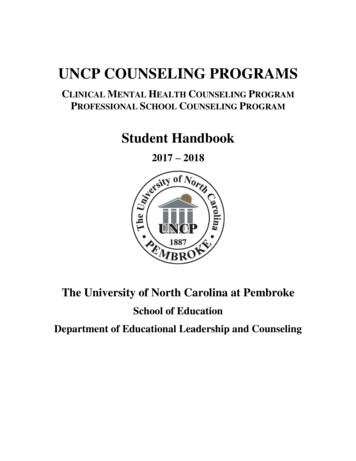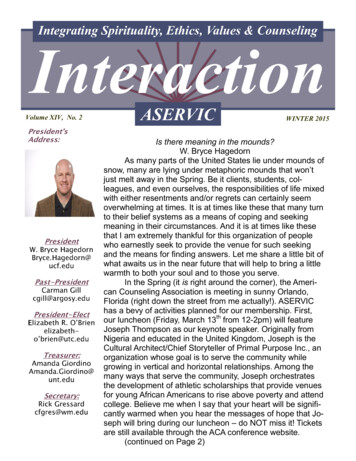
Transcription
Integrating Spirituality, Ethics, Values & CounselingInteractionVolume XIV, No. 2ASERVICWINTER 2015Is there meaning in the mounds?W. Bryce HagedornAs many parts of the United States lie under mounds ofsnow, many are lying under metaphoric mounds that won’tjust melt away in the Spring. Be it clients, students, colleagues, and even ourselves, the responsibilities of life mixedwith either resentments and/or regrets can certainly seemoverwhelming at times. It is at times like these that many turnto their belief systems as a means of coping and seekingmeaning in their circumstances. And it is at times like thesethat I am extremely thankful for this organization of peoplewho earnestly seek to provide the venue for such seekingand the means for finding answers. Let me share a little bit ofwhat awaits us in the near future that will help to bring a littlewarmth to both your soul and to those you serve.In the Spring (it is right around the corner), the American Counseling Association is meeting in sunny Orlando,Florida (right down the street from me actually!). ASERVIChas a bevy of activities planned for our membership. First,our luncheon (Friday, March 13th from 12-2pm) will featureJoseph Thompson as our keynote speaker. Originally fromNigeria and educated in the United Kingdom, Joseph is theCultural Architect/Chief Storyteller of Primal Purpose Inc., anorganization whose goal is to serve the community whilegrowing in vertical and horizontal relationships. Among themany ways that serve the community, Joseph orchestratesthe development of athletic scholarships that provide venuesfor young African Americans to rise above poverty and attendcollege. Believe me when I say that your heart will be significantly warmed when you hear the messages of hope that Joseph will bring during our luncheon – do NOT miss it! Ticketsare still available through the ACA conference website.(continued on Page 2)
Page 2Interaction Volume XIV No. 2—Winter 2015(Continued from Page 1)During the conference, we are pleased to offer several ASERVIC sponsorededucation sessions with topics such as (a) competency-based assessment strategies, (b) ethical and legal implications of client-revealed childhood sexual abuse,(c) spiritual integration in distance clinical supervision, and (d) engaging counselors of varied spiritual and religious backgrounds in case conceptualization. Whenyou’re ready for more socializing, the joint ASERVIC reception (we’ll be breakingbread with our colleagues from AARC, AADA, ACAC, AHC and IAAOC) will be heldon Friday, March 13th from 6-8pm.Other events to attend that offer connections include the Graduate StudentMeeting (March 13th from 2-3pm) and the State Presidents Meeting (March 14thfrom 2-3pm). The culminating ASERVIC event, which is one of the most unique offerings at each ACA conference, is the Interfaith Service held on Sunday, March15th, from 9-10am. Be sure to check out the list of events in their entirety later inthis edition of Interaction.If those events don’t bring enough warmth to your winter-burdened life, theASERVIC National Conference is sure to act like a gigantic snow-blower of thesoul! We will be converging in downtown New York City on July 16-18 to participate in some very exciting events, The two that I most want to highlight include ourPre-conference workshop and our keynote speaker. I’m particularly excited to attend our Pre-conference workshop which will feature a panel of guests from the Interfaith Center of New York. These representatives of the major world belief systems will be sharing their perspectives on adversity and resilience, as well as theirencouragement for counselors to be provide spiritually responsive services to theirclients. Then, I’ll be engaging in mindfulness exercises during our luncheon keynote presentation, Caring for Others by Caring for Ourselves: Building ResilienceThrough Compassion, which will feature Teresa Sivilli of the Garrison Institute.Whereas an apple may have introduced doom to the human race, the Big Applewill offer encouragement and community to those who attend the ASERVIC conference!To conclude this edition of my column, I am continually humbled by thehearts of ASERVIC’s servant-leaders and want to applaud the dedication that is resulting in the multitude of opportunities that you just read about. Join us at theseexciting events in Orlando and New York City and share in the soul-refreshingevents that will bring warmth and meaning to the mounds.
Interaction Volume XIV No. 2—Winter 2015Page 3TheASERVIC ETHICS CORNERWhat ASERVIC Members Need to Know about the 2014 Code of Ethics (Part 2)Janelle Bettis M.A.Argosy University / Washington, DCThis Ethics Corner will be a continuation of the earlier published series outlining the specific changesto the 2014 American Counseling Association (ACA) Code of Ethics (hereinafter referred to as Code). Partone addressed the overview general changes and the integration of a new section related to technology anddistance counseling. This series will discuss the addition of core professional values into the preamble of the2014 Code and how inclusion of these values clarifies how counseling differs from other helping professions.Core Professional ValuesThe 2005 ACA Code of Ethics begins by stating the importance of professional values as an ethicalcommitment to the profession. The 2014 Code did not, however, address values that are inherently importantto counseling professionals. The 2014 Code specifically outlines values that portray ethical commitment tothe profession as well as what it means to be a counselor. These values are as follows: 1. Enhancing humandevelopment throughout the life span; 2. Honoring diversity and embracing a multicultural approach in support of the worth, dignity, potential, and uniqueness of people within their social and cultural contexts; 3. Promoting social justice; 4. Safeguarding the integrity of the counselor–client relationship; and 5. Practicing in acompetent and ethical manner (ACA, 2014, p. 3).The addition of these values gives counselors a clearer understanding of both priorities and professional identity by explicitly stating principles of the profession. There is no doubt that counseling is an ever changing and complex profession, just ask any counselor who has been licensed through the technology “boom”!Thus, the inclusion of clear values gives meaning and direction to a counselor’s work. It is the Code stating“This is what counselor really care about!” These core professional values also portray to the public a counselor’s priorities – essentially core factors which distinguish counselors from other helping professionals.So let’s take a closer look at each core value. Within the counseling profession, emphasis has alwaysbeen placed on lifespan development, particularly the understanding that developmental aspects in a client’slife influence the client’s life experience (Sigelman & Rider, 2014). These experiences, in turn, strongly influence how counselors much approach treatment with that particular individual. It has been long known thatcounselors must place high emphasis on diversity, multiculturalism, and social justice (Sue, Arredondo, &McDavis, 1992). The revised Code emphasizes that all counselors must acknowledge that each individualpresents with various backgrounds and experiences and that these aspects must be considered within the counseling process. Neglecting to consider these unique characteristics is, and always has been, unethical. The inclusion of these elements as a core value let’s others know cultural inclusion is not a “nice to have” but essential to professional counselors. In terms of social justice, counselors recognize individuals face inequalities anddiscrimination and these factors undoubtedly contribute significantly to an individual’s worldview (Lee,2007). Therefore, in the spirit of gaining justice within society, a core value within the counseling profession
Interaction Volume XIV No. 2—Winter2015Page 4is to advocate for others as well as teach others how to advocate for themselves.Counselors also understand that the therapeutic relationship accounts for a majority of positive clientoutcomes and that they must work diligently to provide a safe and comfortable environment for clients. Taking the time to learn about a client’s life experiences, for example, is essential to establishing a positive working alliance. Of critical importance to the client-counselor relationship, and illustrated in the fifth and finalcore value, is practicing in an ethical and competent manner. Counselors do this by only working within theirassociated level of competence, or receiving supervision and training when they must step outside of their“comfort” zone. Counselors understand that providing services without the proper knowledge or educationcan be harmful to individuals, however, they also must always seek training and supervision when an area ofdeficit is identified. Recognizing where one is not competent and working towards receiving additional training (if reasonable) is an integral part of working within ethical guidelines and principles.All of these above described values are what separates the counseling profession from other helpingprofessions. The focus of a counselor’s work with clients includes: viewing the individual within their socialand cultural context; promoting and advocating for social justice when needed; working to create a positivetherapeutic alliance; and ensuring ethical practice by working within the bounds of the counselor’s competence. The addition of the core professional values to the Code (2014) also highlights how important valuesare to the counseling process.ReferencesAmerican Counseling Association (2005). ACA Code of Ethics. Alexandria, VA: AuthorAmerican Counseling Association (2014). ACA Code of Ethics. Alexandria, VA: AuthorKaplan, D. & Martz, E. (2014, July). An Overview of the Revised ACA Code of Ethics. Counseling Today.Retrieved from http://www.counseling.org/docs/default- /ethics/ethics july 2014.pdf?sfvrsn 2Lee, C. C. (Ed.). (2007). Counseling for social justice. Alexandria, VA: American Counseling Association.Sigelman, C., & Rider, E. (2014). Life-span human development. Cengage Learning.We welcome your ideas and submissions for thePlease feel free to contact the editor forquestions or comments. All submissions should adhereto the ASERVIC values and guidelines as published onthe webpage. Articles should be no longer than 350-500words submitted in a word document attachment, andare subject to editing by the editor.
Page 5Interaction Volume XIV No. 2—Winter2015Please join us for the 2015 ASERVIC Conference!July 16-18 in the Big AppleI think the title says it all-please join us for our fourthASERVIC conference to be held from July sixteenth through eighteenth at the Roosevelt Hotel in New York City! After much planning we are thrilled to be offer aconference that we believe combines the best of our previous conferences, based onmember feedback, to provide attendees an experience that will enhance their learning and re-energize the soul. A few of the highlights that we think you’ll enjoy: Program Presentation Tracks (7/17-18) that are specifically designed to delivercontent to practitioners, counselor educators and supervisors, and researchers Programs that deliver information on the four areas of member interest: Spirituality, Ethics, Religion and Value Our conference luncheon (7/18) featuring Keynote Speaker Teresa Sivilli of theGarrison Institute speaking on Caring for Others by Caring for Ourselves:Building Resilience Through Compassion, and engaging participants in a didacticexercise on mindfulness A pre-conference panel (7/16) featuring guests from the Interfaith Center of NewYork, who will provide information on adversity and resilience from faith-basedperspectives, and what they believe will be helpful for counselors to know to beable to provide culturally/spiritually responsive servicesOf course, we will be including events that attendees have come to enjoy such asthe Town Hall (7/18), our awards program during our luncheon, and meeting fellowhelping professionals to network and engage with both professionally and to havefun with during conference downtime!Please consider this also as a great opportunity to include your family on this tripand take advantage of all that Manhattan has to offer either a few days before theconference or a few days after. The guest room rate of 199 is applicable for twodays before and after the conference. Information about conference and hotel registration is now available on the ASERVIC website (www.aservic.org) and we will beproviding more information in the coming months of area attractions and transportation from area airports and train stations.We look forward to seeing you in July as we continue our professional and spiritualgrowth as members of ASERVIC.
WELCOMEAmanda GiordinoTreasurerASERVIC welcomes Amanda Giordino as the newtreasurer. She is an assistant professor at theUniversity of North Texas and has been an ASERVICmember since 2010. She has served in many capacitiesat the regional and university levels, including theSACES awards committee since 2012 as member andas co-chair beginning this year. Additionally she chairsthe Honors and Awards Committee and co-chairs theAdmissions and Recruitment Committee for heruniversity’s Masters’ program.Amanda is excited about the opportunity to serve as treasurer for ASERVIC. Shestates that she aspires to serve at the national-level, particularly in an associationsuch as ASERVIC that represents her research, clinical, and teaching interests.Giordano's primary research area is the integration of religion/spirituality into counseling, with areas of clinical specialization in addictions counseling, spirituality incounseling, and the interaction of the two fields. She states she is honored to serve astreasurer.CALLING ALL GRADUATE STUDENTS!Are you currently enrolled in a Master’s or PhD program andinterested in sharing your experiences in your program or withASERVIC? Do you have questions for our executive board?Looking for an opportunity to share your research interests?WE WANT TO HEAR FROM YOU!Please submit materials to Claudia Sadler-Gerhardt, Editorcgerhard@ashland.eduDeadline for next issue:4/10/15
Page 7Interaction Volume XIV No. 2—Winter 2015Mike PernotHow did you get here? What is yourspiritual story?I was raised Roman Catholic and attended what was once a Catholic affiliated college for physical therapy. It was the attraction to healing that brought me to PT,but it was my religious studies and psychology minors that opened my eyes to somuch internal healing that is needed inthe world – which is why I chose changemy major from PT to my minors of religious studies and psychology and am nowstudying mental health counseling atSUNY Brockport. I’d be remised if I didn’tmention the faculty of Nazareth’s religious studies and psychology departments for providing the space I needed to critically examine myCatholic faith. It was at Nazareth that I stumbled upon the writings ofThomas Merton. Merton’s mysticism,social activism, and integration of Eastern religions and philosophiesjumped off the pages at me and it was like talking to an old friend. Theexperience of God in my life is the most important aspect to me.What drew you membership in ASERVIC?I was drawn to ASERVIC in my early days of looking into counseling. Ithought “Man I wish I could bring my religious and spiritualbackground into counseling somehow ” And as I progressed throughmy program, I learned that to leave any part of yourself out of thecounseling relationship would be a disservice to your client. This is notto say to impose values, as we all know, but to stress the importance ofbeing with your client as your whole self.How do you see yourself being involved in ASERVIC?I plan on attending the ASERVIC Conference in July. I’d love to be partof leadership one day and continue to advocate for and promote the
Page 8Interaction Volume XIV No. 2—Winter 2015Spirituality in the FieldDo you have ideas or a story to share regarding your practice of spirituality in the field? If so, please submit to the next edition of Interaction.The Innovation Committee would like to formally invite currentASERVIC members to consider sharing their “Spirituality in the Field”experiences for publication in an upcoming ASERVIC newsletter.Inquiries and submissions for this special section of the newsletter can besent to Jodi Bartley (jlbartl2@uncg.edu). Follow the ASERVIC newsletter “guidelines for submission” as published inthe most recent newsletter publication (see ASERVIC webpagewww.aservic.org)Articles include an opening paragraph introducing the author to the readers.Articles include a second paragraph describing how the author incorporates one or multiple Spiritual Competencies in practice.Articles include a concluding paragraph or list of resources (books, trainings, websites/blogs, inspirational quote, etc.) related to the practices andcompetencies addressed in the article.A professional picture of the author is attached (in .jpeg format) with thearticle.
Interaction Volume XIV No. 2—Winter 2015Page 9Join us in Orlando, FL, atthe2015 ACA conference for someof our upcoming events!DivisionTitleRoomASERVIC ASERVIC Board MeetingColumbiaASERVIC ASERVIC Editorial BoardDayStartTimeEnd TimeMarch 12,9:00am4:00pmChallenger FridayMarch 13,8:00am9:00amASERVIC ASERVIC LuncheonBarrelSprings 1FridayMarch 13,201512:00pm 2:00pmASERVIC ASERVIC Graduate Stu-Challenger FridayMarch 13,2:00pm3:00pmASERVIC, AARC, AADA,ASERVIC ACAC, AHIAAOC Joint ReceptionBarrelSprings 2FridayMarch 13,20156:00pm8:00pmSaturdayMarch 14,2:00pm3:00pmMarch 15,20159:00am10:00amASERVIC ASERVIC State Presidents DiscoveryThursdayDateASERVIC ASERVIC Interfaith Service Blue Spring SundayPLEASE NOTE: ALL DATES, TIMES, AND ROOMS ARESUBJECT TO CHANGE WITHOUT NOTICE. Check the ACAProgram Guide & Addendem for Final Locations.656
Jun 21, 2021 · Sigelman, C., & Rider, E. (2014). Life-span human development. Cengage Learning. We welcome your ideas and submissions for the Please feel free to contact the editor for questions or comments. All submissions should adhere to the ASERVIC values and guidelines as published
